Emir is an invaluable member of our team, serving as one of our esteemed Account Managers. With a profound passion for on-page SEO, he possesses an exceptional talent for discovering innovative ways to optimise websites and enhance their rankings. Joining our organisation, Loop, in 2022, Emir brought with him a wealth of expertise gained from his Bachelor’s degree in Marketing Management and Advertising. Currently, he is eagerly pursuing his Master’s degree in International Marketing Strategy, further enhancing his comprehensive understanding of the global marketing landscape. Emir thrives on challenges and continuously seeks fresh opportunities to elevate our clients’ businesses to new heights. Aside from his professional endeavours, Emir has an unwavering passion for culinary arts and loves to cook up a storm. This ardour for cooking exemplifies his drive, creativity, and meticulous attention to detail, qualities that seamlessly translate into his work as a Digital Marketing Executive. His commitment to delivering exceptional results and his genuine enthusiasm for each project make him a trusted and highly sought-after professional. Emir’s profound expertise in on-page SEO, combined with his ambitious pursuit of knowledge and dedication to his clients, make him an invaluable asset to our team. His passion, both in and out of the office, reflects his commitment to excellence, leaving an indelible mark on our clients’ businesses.
Posted on 20/02/2025 by Emir Haskic
B2B Marketing Guide: Definition, Strategy & Trends
Table of Contents
- B2B vs. B2C Marketing: Understanding the Differences
- Developing a B2B Marketing Strategy
- Understanding the B2B Sales Funnel
- Types of B2B Marketing & Estimated Costs in the UK
- Customising Your B2B Marketing Approach for Each Stage
- Establishing Essential Groundwork for a Successful B2B Marketing Strategy
- Key Areas to Address in B2B Marketing Planning
- B2B Marketing Activities for Each Stage of the Funnel
- B2B Marketing Channels
- Successful examples of B2B Campaigns
- Emerging Trends in B2B Marketing & Their Impact
- Key Takeaways of the Guide
- Transform Your B2B Marketing Strategy with Loop Digital
B2B (business-to-business) marketing refers to the strategies, tactics, and processes businesses use to promote and sell their products or services to other businesses. Unlike B2C (business-to-consumer) marketing, which targets individual buyers, B2B marketing focuses on engaging professional buyers, decision-makers, and procurement teams. The primary goal is to demonstrate value, solve business challenges, and improve operational efficiency while ensuring a strong return on investment (ROI).
Think of B2B marketing as a construction materials supplier selling to a home builder, while B2C marketing is like a hardware store selling tools to a homeowner. In the B2B world:
- The construction company (buyer) needs reliable, bulk materials to complete multiple projects efficiently.
- They evaluate different suppliers (sellers) based on quality, price, and long-term benefits.
- The supplier (seller) must prove their products improve efficiency, reduce costs, and ensure durability over time.
In contrast, B2C marketing targets individuals. A homeowner shopping at a home improvement shop may choose a product based on price, convenience, or brand loyalty—but they don’t need a bulk supply or a long-term contract.
So, B2B marketing is about building relationships, demonstrating long-term value, and making strategic business decisions, while B2C marketing is more focused on emotions, convenience, and individual preferences.
UK B2B transactions are playing a major role in the nation’s economy, with companies generating approximately £1.7 trillion in B2B revenue in 2024. This accounts for 44% of all business turnover in the country. Digital commerce is an important component, with B2B eCommerce contributing more than £188 billion to the total. Studies indicate that over 75% of UK businesses actively invest in some form of B2B marketing, from digital campaigns to traditional relationship-based strategies. B2B companies in the United Kingdom are experiencing a significant digital transformation in their revenue streams. The proportion of B2B revenue generated through digital channels is expected to grow substantially, from one-third (33%) in 2021 to more than half (56%) in 2025.
Key Characteristics of B2B Marketing
Unlike consumer-driven marketing, B2B marketing operates within a structured, logic-driven framework where long-term business relationships take priority over one-time transactions. Below are the defining characteristics of a strategic B2B marketing approach:
1. Focus on Brand Awareness
Building a strong brand presence is critical in B2B marketing planning. According to LinkedIn, 81% of B2B marketers say that brand awareness significantly impacts their ability to generate and nurture leads. Since B2B transactions often involve high-value deals, businesses prefer to work with brands they trust.
2. Lead Generation and Nurturing
A core component of strategic B2B marketing is lead generation. However, unlike B2C, where consumers often make instant purchasing decisions, the B2B sales cycle is much longer, sometimes taking months or even years. Research shows that 63% of B2B marketers in the UK prioritise lead nurturing as a fundamental part of their marketing strategy to ensure potential customers are engaged throughout the buyer journey.
3. Multiple Decision-Makers
A B2C purchase is typically made by a single consumer, but in B2B marketing strategy, purchasing decisions often involve multiple stakeholders. On average, a B2B buyer group consists of 6 to 10 decision-makers, including procurement officers, department heads, and financial controllers. This complexity requires a tailored marketing approach that addresses the unique concerns of each stakeholder.
4. Emphasis on ROI
Businesses do not invest in products or services based on emotional appeal; they require clear, data-driven evidence of cost-effectiveness and performance improvements. B2B buyers state that financial justification and ROI calculations significantly influence their purchasing decisions. B2B companies must therefore provide detailed case studies, whitepapers, and reports demonstrating measurable benefits.
5. Relationship-Driven Sales Process
A strong B2B marketing plan focuses on long-term partnerships rather than one-time transactions. Statistics show that 77% of B2B companies consider relationship-building crucial for retaining business clients. Consistent engagement through email marketing, personalised consultations, and after-sales support ensures potential customers become loyal, repeat buyers.
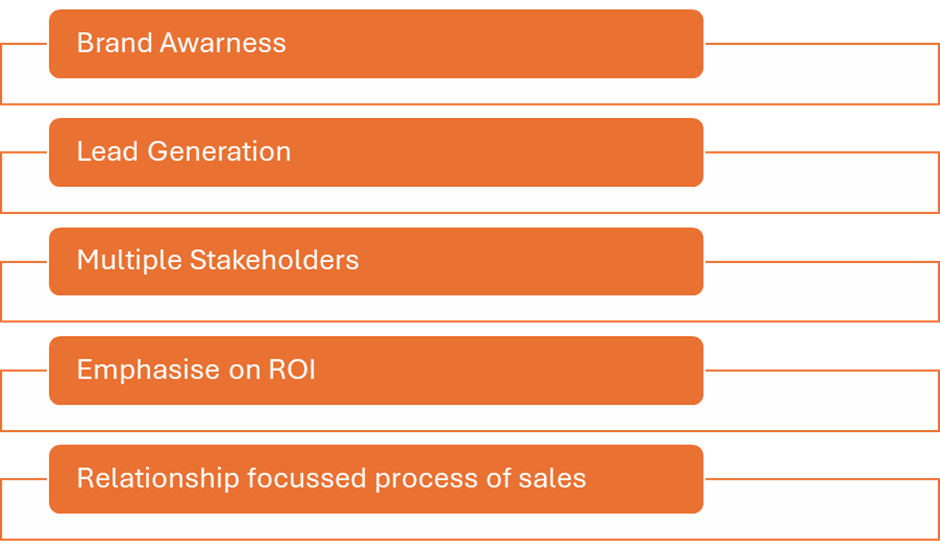
Components of B2B Marketing
B2B vs. B2C Marketing: Understanding the Differences
B2B and B2C marketing differ significantly in their approach, audience, and sales cycle. The table below illustrates the key differences between marketing business to business and business-to-consumer marketing:
| Feature | B2B Marketing | B2C Marketing |
| Target Audience | Businesses, organisations, and professional buyers | Individual consumers looking for personal purchases |
| Decision-Making | Logical, ROI-driven, involving multiple stakeholders | Emotional, impulse-driven, typically a single buyer |
| Sales Cycle | Longer, complex, multiple touchpoints | Shorter, often instantaneous purchase decisions |
| Marketing Approach | Relationship-based, educational, and data-driven | Entertainment-focused, promotional, persuasive |
| Customer Needs | Efficiency, productivity, cost reduction | Convenience, entertainment, lifestyle improvement |
| Content-Type | Whitepapers, case studies, reports, webinars, industry research | Social media posts, influencer collaborations, video ads |
| Marketing Channels | LinkedIn, email marketing, content marketing (SEO, blog posts) | Facebook, Instagram, TikTok, YouTube, online ads |
Developing a B2B Marketing Strategy
A successful B2B marketing strategy requires a clear, logical, and well-defined roadmap to effectively engage potential customers, nurture leads, and drive long-term business growth. Unlike B2C marketing, where purchasing decisions are often impulsive, B2B transactions involve a longer buyer journey, multiple stakeholders, and a strong emphasis on return on investment (ROI).
To maximise success, businesses must align their B2B marketing plan with the sales funnel, ensuring that marketing efforts address each stage of the purchasing decision. This structured approach enables B2B companies to:
- Build brand awareness and credibility
- Educate B2B buyers about their products or services.
- Guide potential customers through the decision-making process.
- Establish long-term relationships for repeat business.
Understanding the B2B Sales Funnel
The B2B sales funnel outlines the typical journey a business buyer takes, from initial brand discovery to becoming a loyal customer. By tailoring marketing strategies to each stage of the funnel, businesses can optimise lead generation, increase conversions, and improve customer retention. Studies suggest that 90% of B2B buyers start their purchasing decision with an online search, highlighting the importance of digital visibility.
1. Awareness Stage – Capturing Attention and Building Visibility
At the awareness stage, the B2B buyer is just beginning their research and exploring potential solutions to their business challenges. They may not yet have a clear understanding of their specific needs or the best options available.
- Marketing goal: Establish a strong online presence and educate potential customers.
- Marketing activities:
- Content marketing: Publishing informative blog posts, whitepapers, and industry reports to position your business as a thought leader.
- Search engine optimisation (SEO): Ensuring your website ranks high on search engines when businesses look for relevant solutions.
- Social media marketing: Engaging with your audience on platforms like LinkedIn, Twitter, and YouTube.
- Paid advertising: Running targeted campaigns and paid ads using search engines (Google Ads) and social media platforms to increase brand exposure.
2. Consideration Stage – Evaluating Solutions and Comparing Options
At this point, the buyer has identified their needs and is actively researching potential vendors. They will compare pricing, features, and value propositions to determine the best fit for their business. 78% of B2B buyers consume at least three pieces of content before engaging with a sales representative.
- Marketing goal: Demonstrate expertise, credibility, and value to differentiate from competitors.
- Marketing activities:
- Case studies and testimonials: Showcasing how your products or services have helped other businesses.
- Webinars and podcasts: Offering in-depth insights and solutions to industry-specific challenges.
- Whitepapers and e-books: Providing detailed data and expert knowledge to assist in decision-making.
- Email marketing: Sending personalised recommendations, industry insights, and product comparisons.
3. Decision Stage – Making the Final Purchase
In the decision stage, the buyer is ready to select a vendor. At this point, they are looking for clear, persuasive information that validates their choice and reassures them about their investment. 67% of B2B buyers say they are more likely to purchase from a company with a strong reputation and verified case studies.
- Marketing goal: Provide compelling evidence that your company is the best choice.
- Marketing activities:
- Free trials and demos: Allowing buyers to experience your products or services firsthand.
- Strong proposals: Presenting tailored, data-driven solutions that directly address the buyer’s needs.
- Industry certifications and awards: Showcasing credibility and trustworthiness.
- Referral marketing: Encouraging existing customers to advocate for your brand.
4. Retention Stage – Building Long-Term Business Relationships
A well-planned B2B marketing approach does not end after the initial sale. Since many B2B transactions involve long-term contracts, service renewals, and repeat purchases, maintaining strong customer relationships is essential. Acquiring a new B2B customer can be 5 to 25 times more expensive than retaining an existing one.
- Marketing goal: Strengthen client loyalty, encourage repeat business, and increase lifetime value.
- Marketing activities:
- Email newsletters: Keeping clients informed about updates, trends, and best practices.
- Customer support and account management: Providing exceptional after-sales service.
- Exclusive industry insights: Sharing research reports and educational content to add ongoing value.
- Loyalty programmes and discounts: Offering incentives for repeat purchases.
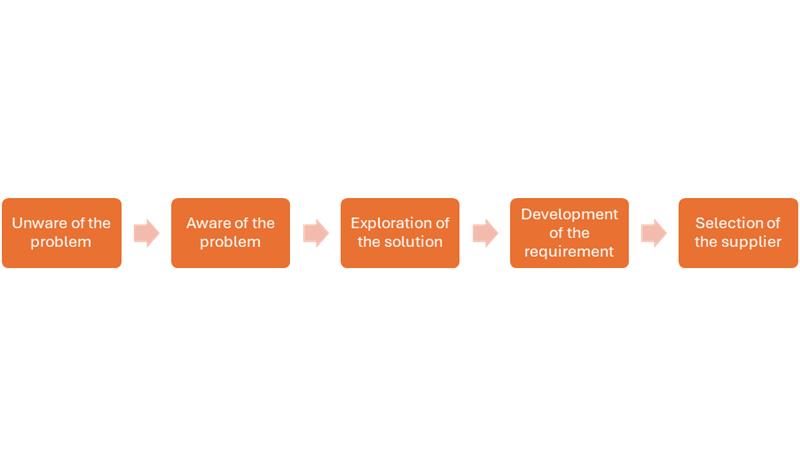
The B2B Marketing Buyer’s Journey
Types of B2B Marketing & Estimated Costs in the UK
B2B marketing is essential for businesses looking to attract, engage, and convert potential clients. Various strategies, including content marketing, SEO, email campaigns, PPC advertising, and event marketing, help businesses establish authority and generate leads. Each approach requires expertise, time, and financial investment, with costs varying based on business needs and competition.
Hiring a marketing agency offers significant advantages. Agencies bring industry experience, data-driven strategies, and access to premium tools, ensuring a higher return on investment. They save time, optimise campaigns for better performance, and provide measurable results, allowing businesses to focus on core operations while maximising their marketing efforts.
| B2B Marketing Type | Description | Key Activities | Estimated Cost (£) |
| Content Marketing | Focuses on delivering valuable, educational content to attract and nurture leads. | 1. Blog posts & articles 2. Case studies & whitepapers E-books & guides 3. Infographics & video content | £125 – £10,000 per month Blog writing: £200 – £500 per post Whitepapers: £1,500 – £3,000 per piece Video production: £2,000 – £10,000 per project |
| Search Engine Optimisation (SEO) | Enhances online visibility and drives lead generation through organic search. | 1. On-page SEO (content & metadata) 2. Off-page SEO (backlinks & authority) 3. Technical SEO (site speed & security) | £500 – £5,000 per month Small business SEO: £500 – £1,500 per month Enterprise SEO: £2,500 – £5,000 per month |
| Email Marketing | Cost-effective method to engage B2B buyers, drive conversions, and nurture relationships. | 1. Personalised email campaigns Newsletters & product updates 2. Automated drip campaigns | £200 – £2,000 per campaign Email software: £50 – £500 per month Copywriting & design: £200 – £1,500 per campaign |
| Pay-Per-Click (PPC) Advertising | Paid digital ads targeting decision-makers with high-intent searches. | 1. Search ads (Google AdWords) 2. Display ads (brand awareness) 3. LinkedIn sponsored content | £500 – £10,000 per month Google Ads: £1 – £10 per click LinkedIn Ads: £5 – £50 per click |
| Social Media Marketing | Uses platforms to engage B2B decision-makers and promote thought leadership. | 1. LinkedIn marketing 2. Twitter & YouTube engagement 3. Paid social media advertising | £500 – £5,000 per month LinkedIn marketing: £500 – £5,000 per month Social media ads: £0.50 – £5 per click |
| Influencer & Referral Marketing | Builds credibility through industry experts and trusted referrals. | 1. Partnerships with thought leaders 2. Customer testimonials & referrals 3. Affiliate & partner marketing | £1,000 – £10,000 per campaign Influencer campaigns: £1,000 – £10,000 Referral incentives: £50 – £500 per referral |
| Event & Webinar Marketing | Engages potential clients through live events, industry conferences, and networking. | 1. Live webinars & Q&A sessions 2. Trade shows & conferences 3. Networking events | £1,000 – £20,000 per event Webinar hosting: £500 – £5,000 per event Trade show participation: £5,000 – £20,000 per event |
Customising Your B2B Marketing Approach for Each Stage
Understanding where a B2B buyer is in the sales funnel allows marketers to personalise their approach and effectively nurture leads. By focusing on content marketing, digital marketing, and social proof, B2B companies can build credibility and foster lasting relationships with clients.
By aligning B2B marketing strategies with the buyer’s journey, businesses can create impactful marketing campaigns, increase conversion rates, and drive sustainable growth.
Establishing Essential Groundwork for a Successful B2B Marketing Strategy
Before launching a B2B marketing strategy, businesses must establish a solid foundation to ensure that their efforts are effective, data-driven, and aligned with their target audience’s needs. A well-planned B2B marketing plan not only enhances brand visibility but also improves lead generation, conversion rates, and long-term customer retention.
To achieve strategic B2B marketing success, companies must focus on key preparatory steps. Understanding brand positioning, buyer personas, competition, and marketing channels is critical to developing an optimised marketing approach that reaches the right audience and drives engagement.
Key Areas to Address in B2B Marketing Planning
1. Know Your Brand Positioning – Define Your Unique Value Proposition
Before engaging in business-to-business marketing, companies must clearly define their brand positioning—what differentiates them from competitors and why potential customers should choose them. Strong brand positioning ensures that all marketing messages, campaigns, and B2B marketing strategies remain consistent and compelling. 77% of B2B marketers say that building a strong brand is critical for long-term growth, as it improves customer trust and loyalty.
Consider the following when defining brand positioning:
- Company background: When was the company founded, and what is its mission?
- Core values and vision: What principles guide the business, and how do they align with customer expectations?
- Unique selling points (USPs): What makes the business stand out in terms of products or services, innovation, or customer service?
- Pain points addressed: What business challenges do your offerings solve for B2B buyers?
A strong brand position creates brand awareness, helps maintain a positive brand reputation, and ensures B2B companies remain top-of-mind for potential buyers.
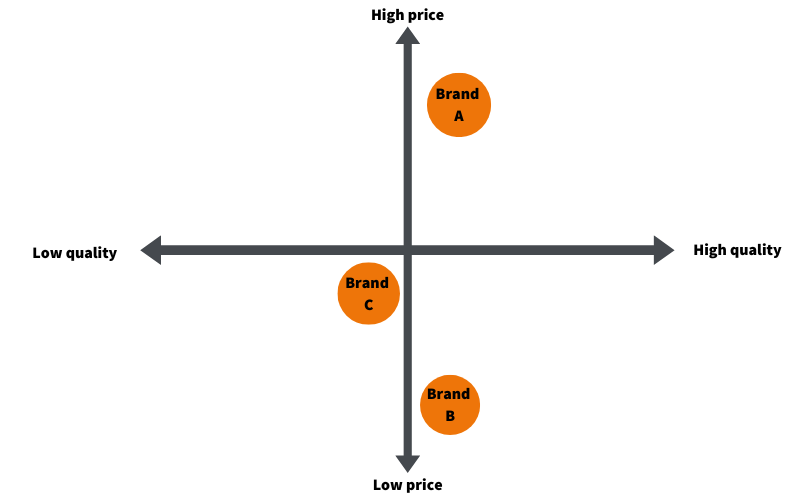
Brand positioning map
2. Know Your Target Buyer Personas – Understand Your Ideal Customers
A well-defined B2B marketing approach must be tailored to the specific needs and behaviours of the target audience. Unlike B2C marketing, where purchases are often emotion-driven, B2B buyers base decisions on logic, data, and return on investment (ROI). 68% of B2B buyers prefer to research independently before engaging with a sales representative, making targeted content marketing crucial.
Key aspects of defining B2B buyer personas:
- Industry and company size: Are your ideal customers large corporations, SMEs, or startups?
- Job roles and decision-makers: Who are the key stakeholders involved in the purchasing decision (e.g., CEOs, procurement managers, finance directors)?
- Pain points and challenges: What problems do your products or services help resolve?
- Research habits: How do your buyers gather information? Do they rely on search engines, blog posts, case studies, or social media platforms?
By understanding the needs of B2B buyers, businesses can craft marketing campaigns that provide valuable insights, encourage engagement, and drive conversions.
3. Know Your Competition – Conduct Competitive Analysis
A thorough competitor analysis helps businesses refine their B2B marketing strategy by identifying opportunities to stand out in the marketplace. Understanding how competitors operate can reveal gaps in their marketing approach and allow businesses to develop superior offerings. 89% of B2B marketers consider competitor research essential in developing a successful marketing strategy business to business.
Key competitive factors to analyse:
- Market share: How much of the industry’s revenue do competitors control?
- Pricing strategies: Are your prices competitive compared to market standards?
- Marketing efforts: What B2B marketing strategies do competitors use to attract their audience?
- Sales techniques: What channels and methods are used for customer acquisition?
- Social media presence: How do competitors engage with their audience on LinkedIn, X, and other social media platforms?
Regularly assessing competitor activities allows businesses to adjust their marketing planning, refine their B2B marketing plan, and enhance their value proposition.
4. Know Your Marketing Options – Identify the Best Channels for Engagement
Not all marketing strategies work for every B2B company. Businesses must determine the most effective channels for reaching their target audience and tailor their B2B marketing approach accordingly. 75% of B2B buyers use social media to make purchasing decisions, with LinkedIn being the most popular platform.
Key marketing channels to consider:
- Search Engine Optimisation (SEO): Increases visibility on search engines, helping potential buyers find your brand.
- Content Marketing: Engaging blog posts, case studies, and research reports establish authority and attract leads.
- Email Marketing: One of the most effective B2B marketing strategies for nurturing leads and maintaining customer relationships.
- Social Media Marketing: Platforms like LinkedIn are crucial for B2B companies, enabling professional networking and brand promotion.
- Paid Advertising: Google Ads and LinkedIn Ads can drive targeted traffic and boost lead generation.
- Influencer & Referral Marketing: Partnering with industry experts increases credibility and trust.
By selecting the right marketing channels, businesses can optimise their campaigns, improve lead generation, and increase overall revenue.
B2B Marketing Activities for Each Stage of the Funnel
Once core principles, USPs, and offerings are established, communications and touchpoints users want to see at each stage of the funnel can be considered. A clear vision of the targeted buyer and brand offer, and selected optimal channels to reach them are key.
| Stage of the Funnel | Marketing Activities | Purpose & Approach |
| Awareness (Initial discovery of a brand as a potential solution) | – Engaging blog posts featuring industry insights and solutions – Top 10 tips/advice guides to establish authority – Infographics/videos to present data in a visually appealing way – Solutions-based editorial highlighting common business challenges and resolutions | – Boost brand awareness and credibility – Educate B2B buyers about common industry pain points – Position the business as a thought leader in the sector |
| Realisation of Needs (The buyer begins actively researching potential solutions) | – Exclusive industry research showcasing trends and statistics – Whitepapers detailing in-depth market analysis – Buyers’ guides providing structured information about products or services – Podcasts or vodcasts with industry experts – Webinars offering live demonstrations and Q&A sessions | – Provide valuable and data-driven content for decision-makers – Help potential customers evaluate their needs and consider solutions – Establish B2B companies as trusted industry experts |
| Consideration (Buyers compare and evaluate different options before making a decision) | – Product guides detailing features, benefits, and comparisons – Case studies/client videos demonstrating real-world success stories – Third-party product reviews and testimonials – Industry standards showcasing compliance and reliability – Industry awards reinforcing credibility – Positive editorial and PR coverage | – Strengthen trust and confidence in the B2B marketing approach – Provide proof of ROI and tangible benefits – Address concerns through case studies and external validation |
| Decision (Buyers select a vendor and finalise their purchasing decision) | – Strong proposals highlighting pricing, benefits, and implementation – Customised sales pitches tailored to the specific needs of the buyer – Live product demos to showcase real-time functionality – One-to-one consultations for personalised support | – Push the B2B buyer towards conversion – Demonstrate superior value over competitors – Address final objections and reinforce why the company is the best choice |
| Retention (Ensuring customer satisfaction, loyalty, and repeat business) | – Regular reports offering insights into product performance and improvements – Email newsletters providing updates, industry trends, and personalised content – Loyalty programmes rewarding long-term customers – Exclusive customer events such as VIP webinars and networking opportunities – Customer support follow-ups to enhance engagement | – Strengthen long-term B2B relationships – Maintain brand awareness and keep customers informed – Encourage repeat business and upselling opportunities |
B2B Marketing Channels
Selecting the right marketing channels is crucial for executing a successful B2B marketing strategy. Different channels cater to different stages of the buyer journey, ensuring that potential customers receive the right message at the right time.
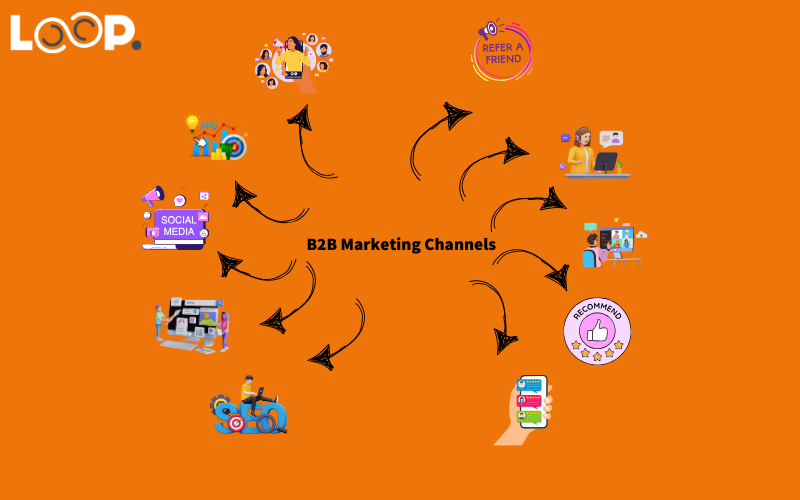
B2B Marketing Channels
1. Awareness Stage (Building Brand Presence & Reaching Potential Customers)
At this stage, businesses must focus on brand awareness and visibility. The goal is to attract B2B buyers who may not yet be familiar with the company or its products or services.
- Search Engine Optimisation (SEO): Optimising website content for search engines ensures that B2B companies appear at the top of search results when potential buyers seek solutions.
- Content Marketing: Publishing blog posts, industry insights, and educational content helps establish credibility. Podcasting is also an effective way to engage audiences.
- Social Media Marketing: Leveraging LinkedIn, X, and YouTube allows businesses to connect with their target audience and build a strong online presence.
- Pay-Per-Click (PPC) Advertising: Running targeted Google AdWords campaigns helps increase visibility and attract potential customers searching for relevant services.
2. Consideration Stage (Engaging & Educating Prospects)
Once prospects are aware of the brand, they move into the consideration phase, comparing different options before making a purchasing decision.
- Email Marketing: Sending personalised emails, newsletters, and product updates helps nurture leads and keep them engaged.
- Search Engine Optimisation (SEO): Maintaining high rankings in search engines ensures continuous visibility during the research phase.
- Content Marketing (Reviews & Testimonials): Featuring case studies, testimonials, and independent product reviews reassures buyers that they are making the right choice.
3. Decision Stage (Encouraging Conversion & Final Purchase)
At this point, B2B buyers need that final push to make their purchasing decision.
- Email Marketing: Sending targeted offers, product comparisons, and strong marketing campaigns can help close the deal.
- Influencer Marketing: Partnering with industry influencers who can endorse the product or service increases trust.
- Referral Marketing: Encouraging satisfied customers to refer others can drive new business and strengthen relationships.
4. Retention Stage (Building Long-Term Relationships & Encouraging Repeat Business)
A key focus of strategic B2B marketing is maintaining customer loyalty and encouraging repeat purchases.
- Email Marketing: Regular updates, newsletters, and industry insights help keep existing customers engaged.
- Customer Support & Follow-Ups: Personalised after-sales support builds long-term relationships.
- Exclusive Events & Webinars: Hosting events, training sessions, and webinars for existing clients adds continuous value.
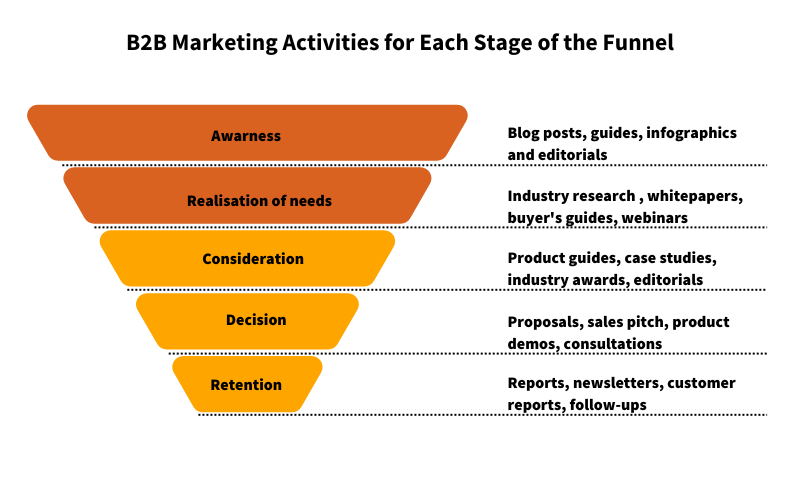
Sales Funnel of B2B Marketing
Successful examples of B2B Campaigns
B2B marketing campaigns thrive when they are innovative, engaging, and tailored to their target audience. Successful campaigns use strategies like account-based marketing, thought leadership, data-driven insights, and content marketing to drive engagement and brand awareness. Below are some standout examples of B2B marketing done right, showcasing how companies like Loom, GfK, Spotify, and Slack leveraged unique approaches to achieve measurable success.
1. Loom
Overview: Loom realised LinkedIn was the perfect place to start due to regular engagement with leaders in their sector and created a list of the key accounts they wanted to target. Nick Lafferty, head of growth at Loom, created personalised ads tailored to each client, using templates and company logos while changing specific details such as the number of team members a certain leader has.
Goals Achieved: Loom’s campaign had an average click-through rate (CTR) of 2% to 3.5% and an average cost-per-click (CPC) of $4 to $10 from targeted accounts.
Type of B2B Marketing: Account-based marketing (ABM). Loom developed a scalable solution using a template that was built out over time and was suitable for potential buyers.

Image: Loom (https://www.loom.com/community/marketing-campaign)
2. GfK
Overview: GfK successfully took a hot topic (AI) and made it their own, positioning themselves as authorities in the conversation from the start. Gonzalo became the first CMO to publicly debate with a robot.
Goals Achieved: GfK’s campaign put itself at the centre of a conversation that was ripe with engagement. Gonzalo was able to command attention and increase his personal profile and position as an industry leader while raising GfK’s brand awareness in the process.
Type of B2B Marketing: Thought leadership. The strength of thought leadership in B2B is addressing genuinely interesting and engaging subjects that will get people talking.
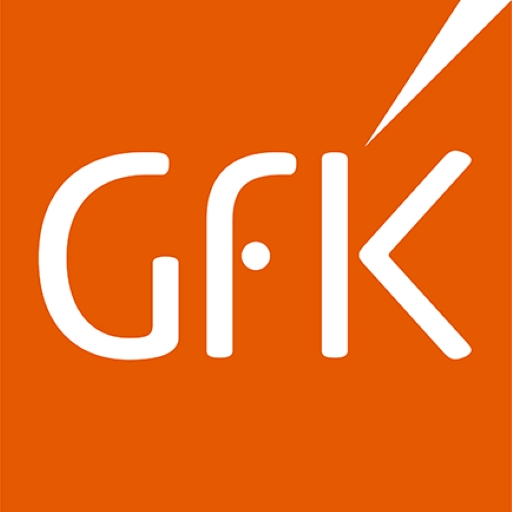
Image Source: GfK (https://www.gfk.com/)
3. UK Business Finance Specialist
Overview: A UK-based business finance specialist sought to increase brand awareness and attract customers in a competitive market. They aimed to grow their business loan and asset/equipment finance areas and improve their website’s performance and customer journey.
Goals Achieved: The company achieved a 603% increase in conversions within the first 3 months of the campaign. Paid traffic to their website increased by 377%, and their keyword rankings grew from 3 to 4071. The cost per conversion was also reduced by 70% over a 2-year period.
Type of B2B Marketing: Integrated digital marketing solutions. The company utilised a combination of website development, SEO, PPC, and content creation to enhance brand awareness, generate leads, and improve customer experience1. They provided valuable content to customers at different stages of the buyer’s journey and offered regular consultations and detailed reports to the client
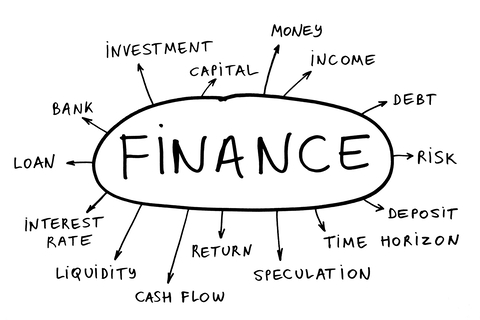
4. Slack
Overview: Slack created a humorous mockumentary-style ad that showcased real customer experiences. This campaign broke away from the typical seriousness of B2B marketing by injecting humour and relatability, making it memorable and engaging while also highlighting the product’s benefits.
Goals Achieved: The narrative was based on a real customer’s experience, which lent authenticity to the campaign. It didn’t just promote Slack’s features; it showcased how real people in a real company used Slack to improve their work life.
Type of B2B Marketing: Content Marketing. Injecting humour and relatability into your campaigns can make your product more appealing, especially if your target audience is already saturated with traditional marketing messages.
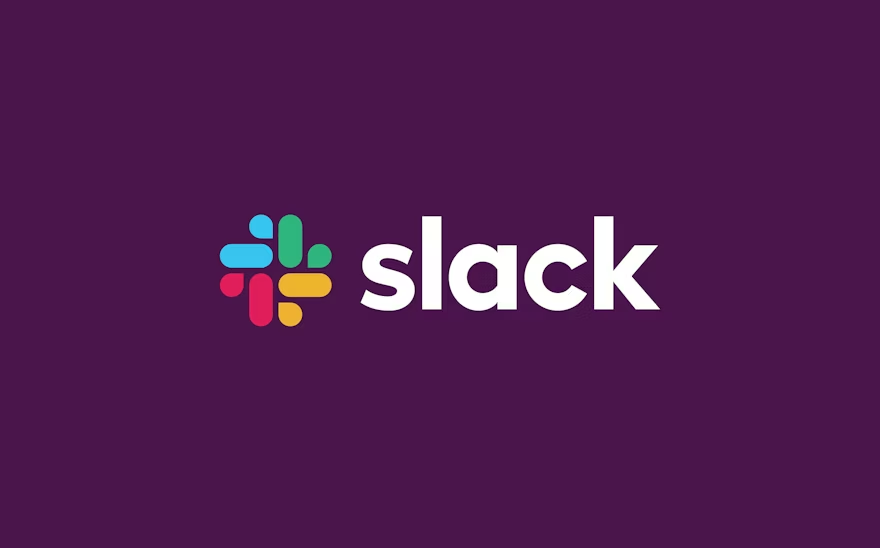
Image Source: Slack.com (https://slack.com/intl/en-in/)
Emerging Trends in B2B Marketing & Their Impact
As technology and consumer expectations evolve, B2B marketing is undergoing a significant transformation. Businesses must adapt to AI-driven personalisation, immersive experiences, community building, video dominance, and ethical marketing to stay competitive. These trends are shaping how companies engage with their audience, build trust, and drive long-term value. Understanding these shifts allows businesses to refine their B2B marketing strategies and remain ahead of the curve.
| Trend | Impact on B2B Marketing | Benefiting Companies |
| AI-Powered Personalisation at Scale | AI-driven marketing is transforming how businesses engage with their audience by delivering hyper-personalised content and offers. By analysing customer data in real time, AI ensures the right message reaches the right person at the right time, boosting engagement and conversion rates. | Companies with large customer datasets and advanced CRM systems. SaaS providers, enterprise software firms, and large B2B service organisations. Marketing agencies that integrate AI-powered B2B personalisation. |
| Immersive Experiences (AR/VR/Metaverse) | Augmented Reality (AR), Virtual Reality (VR), and the Metaverse are reshaping B2B marketing strategies by enabling interactive and immersive experiences. This includes virtual product demos, simulations, and online trade shows, enhancing customer understanding and engagement. | Businesses with complex products or services that require hands-on demonstrations. Manufacturers of industrial equipment, medical device companies, and tech vendors. Event companies offering immersive B2B marketing solutions. |
| Emphasis on Community Building | B2B buyers seek more than just a product or service—they value knowledge-sharing and networking. Brands that create engaging communities, both online and offline, will strengthen customer loyalty, advocacy, and trust. | Businesses with a strong brand identity and clear value proposition beyond their core B2B offering. Educational platforms and thought leaders in their industries. Companies offering comprehensive solutions that foster peer-to-peer engagement. |
| Video Dominance | Video remains the most engaging content format, with short-form, live, and interactive videos gaining traction. B2B video marketing helps brands tell compelling stories, demonstrate value, and build trust with their target audience. | Companies with a strong brand story or complex B2B product/service that requires visual demonstrations. Businesses looking to improve customer engagement through high-quality video content. Brands that prioritise B2B lead generation via YouTube, LinkedIn Live, and webinars. |
| Data Privacy & Ethical Marketing | With stricter data privacy regulations and increasing consumer awareness, businesses must implement ethical marketing strategies. This includes transparent data collection, respecting privacy, and authentic communication to build long-term customer trust. | Businesses in heavily regulated industries (e.g., finance, healthcare). Companies that prioritise long-term customer relationships. Brands that use transparent and ethical B2B marketing as a competitive advantage. |
To wrap up
Successful B2B marketing requires a strategic, multi-faceted approach that combines traditional relationship-building with modern digital techniques. As businesses navigate an increasingly complex marketplace, the ability to create value-driven, personalised marketing campaigns while maintaining strong ROI has become paramount.
The key to success lies in understanding that B2B marketing is fundamentally different from B2C marketing, requiring:
- A deep focus on long-term relationship building rather than quick transactions
- Content that emphasises ROI and business value over emotional appeals
- Marketing strategies tailored to multiple decision-makers within organisations
- A comprehensive understanding of complex buying cycles and stakeholder needs
- Integration of both digital and traditional marketing channels
In today’s digital-first environment, B2B companies must embrace emerging trends while maintaining core marketing principles. The rise of AI-powered personalisation, immersive experiences, and video content creates new opportunities for engagement, while data privacy and ethical marketing considerations ensure sustainable growth.
The most successful B2B marketing strategies will continue to be those that:
- Clearly demonstrate value and ROI to stakeholders
- Leverage data-driven insights to inform decision-making
- Build strong, trust-based relationships with clients
- Adapt to changing technological landscapes
- Maintain consistent brand messaging across all channels
- Focus on delivering high-quality, educational content
- Nurture leads through personalised communication
As the B2B landscape evolves, companies must remain agile and responsive to changing market conditions while maintaining focus on their core value proposition. By following the strategies and insights outlined in this guide, businesses can develop robust marketing approaches that drive growth, foster lasting relationships, and create sustainable competitive advantages in the marketplace.
Remember that successful B2B marketing is not a destination but a journey of continuous improvement, learning, and adaptation. The most effective marketers will be those who consistently evaluate, refine, and optimise their strategies while staying true to their brand values and customer needs.
Key Takeaways of the Guide
Fundamental Differences Between B2B and B2C Marketing
- B2B marketing focuses on logic-driven, ROI-based decisions rather than emotional appeals
- Purchase decisions typically involve 6-10 stakeholders rather than a single consumer
- Sales cycles are longer and more complex, often taking months or years
- Relationship building and long-term partnerships take priority over one-time transactions
Critical Success Factors
Brand Building & Trust
- 81% of B2B marketers report brand awareness significantly impacts lead generation
- A strong brand presence is essential for high-value B2B transactions
- Credibility is built through case studies, whitepapers, and industry expertise
Digital Transformation
- UK B2B digital revenue is projected to grow from 33% (2021) to 56% (2025)
- 90% of B2B buyers begin their purchase journey with online search
- Digital channels are becoming increasingly crucial for lead generation and nurturing
Content Marketing & Lead Nurturing
- 78% of B2B buyers consume at least three pieces of content before engaging with sales
- Educational content must address specific pain points and demonstrate clear ROI
- Content should be tailored for different stages of the buyer journey
Marketing Channel Effectiveness
- LinkedIn is the most effective social media platform for B2B marketing
- Email marketing remains one of the most cost-effective channels for nurturing leads
- SEO and content marketing are crucial for long-term organic growth
Investment Considerations
- Content marketing: £125-£10,000 per month
- SEO: £500-£5,000 per month
- Email marketing: £200-£2,000 per campaign
- Social media marketing: £500-£5,000 per month
- Event marketing: £1,000-£20,000 per event
Best Practices for Implementation
Strategy Development
- Define clear brand positioning and unique value proposition
- Create detailed buyer personas for targeted marketing
- Conduct a thorough competitive analysis
- Select appropriate marketing channels based on audience preferences
Sales Funnel Alignment
- Awareness: Focus on educational content and brand visibility
- Consideration: Provide detailed comparisons and case studies
- Decision: Offer demonstrations and personalised consultations
- Retention: Maintain engagement through regular communication and value-add services
Measurement & Optimisation
- Track ROI across all marketing channels
- Monitor lead quality and conversion rates
- Regularly assess and adjust marketing strategies
- Focus on customer retention and lifetime value
Emerging Trends to Watch
- AI-powered personalisation for scaled customer engagement
- Immersive experiences through AR/VR technology
- Video content dominance in B2B communication
- Increased focus on data privacy and ethical marketing
- Community building and peer-to-peer engagement
Cost Management
- Acquiring new B2B customers can be 5-25 times more expensive than retention
- Focus on both acquisition and retention strategies
- Prioritise high-ROI channels based on industry and audience
- Balance investment across different marketing channels
Transform Your B2B Marketing Strategy with Loop Digital
Ready to elevate your B2B marketing game? Loop Digital, your ultimate B2B marketing consultancy, is here to help you navigate the complex world of business-to-business marketing and drive exceptional results.
What You’ll Get:
- A FREE 30-minute consultation with our B2B marketing experts
- Comprehensive, no-obligation website audit
- Expert insights tailored to your business needs
- Strategic recommendations for growth
Our team of seasoned B2B marketing specialists will analyse your current strategy, identify opportunities, and provide actionable insights to boost your ROI. Whether you’re struggling with lead generation, content strategy, or digital presence, we’ve got you covered. Contact Loop Digital Now.
Looking for your next opportunity?
Digital marketing careers
We’re always on the lookout for talented individuals to join our ever growing team. If you think you’d be a great match for Loop Digital, we’d love to hear from you.

Join 300+ business owners getting weekly growth strategies - subscribe now.
"*" indicates required fields






